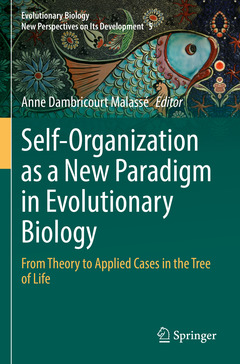Self-Organization as a New Paradigm in Evolutionary Biology, 1st ed. 2022 From Theory to Applied Cases in the Tree of Life Evolutionary Biology – New Perspectives on Its Development Series, Vol. 5
Coordonnateur : Dambricourt Malassé Anne

The epistemological synthesis of the various theories of evolution, since the first formulation in 1802 with the transmission of the inherited characters by J.B. Lamarck, shows the need for an alternative synthesis to that of Princeton (1947). This new synthesis integrates the scientific models of self-organization developed during the second half of the 20th century based on the laws of physics, thermodynamics, and mathematics with the emergent evolutionary problematics such as self-organized memory.
This book shows, how self-organization is integrated in modern evolutionary biology. It is divided in two parts: The first part pays attention to the modern observations in paleontology and biology, which include major theoreticians of the self-organization (d?Arcy Thompson, Henri Bergson, René Thom, Ilya Prigogine). The second part presents different emergent evolutionary models including the sciences of complexity, the non-linear dynamical systems, fractals, attractors, epigenesis, systemics, and mesology with different examples of the sciences of complexity and self-organization as observed in the human lineage, from both internal (embryogenesis-morphogenesis) and external (mesology) viewpoints.
Table of Contents
1 Introduction: Understanding the Origins and Evolution of Living Organisms. The Necessity of Convergence Between Old and New Paradigms
Anne Dambricourt Malassé
Part I The Modernity of Old Paradigms
2 Self-Organization Meets Evolution: Ernst Haeckel and Abiogenesis
Georgy S. Levit and Uwe Hossfeld
3 D'Arcy Thompson on Form and Intrinsic Purposiveness: Contributions to Epigenetic and Autopoietic Theory
Adam Scarfe
4 From Dissipative Structures to Biological Evolution: A Thermodynamic Perspective
Dilip Kondepudi, James Dixon and Benjamin De Bari
5 Evolutionary Transformations of Body Plan in Metazoa: Self-Organization, Topological Transformations, and Genomic-Morphogenetic CorrelationsValeria. V. Isaeva
6 The Challenge of Bergson, Instinct as Form
Stephen Earle Robbins
Part II Modernity of Self-Organization and Emerging Paradigms
7 Biological Evolution of Microorganisms
Werner Arber8 Self-Organization in Embryonic Development : Myth and Reality
Stuart Newman
9 The Morphoprocess and Diversity of Evolutionary Mechanisms of Metastable StructuresAndrei I. Granovitch
10 Mesological Plasticity as a New Model to Study Plant Evolution, Interactive Ecosystems and Self-organized Evolutionary Processes
Marc-Williams Debono
11 Thermal Worm Model to Describe Log-Periodicity in the Tree of Life.
Diogo Queiros-Conde, Jean Chaline and Ivan Brissaud
12 Sapiens and Cognition: The Optimal Vertical Nervous System. The Last Primate Threshold of Self-Organized and Self-Memorizing Increasing Complexity from Gametes to Embryo
Anne Dambricourt Malassé
13 Evolutionary CreativityEdgar Morin
Anne Dambricourt Malassé (PhD 1987 in paleoanthropology, Accreditation to Supervise Research 2011) is born in 1959 at Neuilly-sur-Seine (France). She is researcher at the National Center for Scientific Research (CNRS) and attached to the National Museum of Natural History (NMNH), Paris, since 1990. The research center is housed by the Institute of Human Paleontology, a Foundation Albert 1st Prince of Monaco (1910). Her research has been focusing more than 30 years to the evolution of the face and the skull base in the human lineage. She has put in light their morphodynamic links in relation to the neural crest cell migration, the bending of the chondrocranium and the straightening of the neural tube, i.e. the verticalization of the cranio-caudal axis. This new approach opened human paleontology to the sciences of complexity and nonlinear dynamic systems, the mathematical modelling of unstable systems and the homeotic genes. Her dynamical and geometrical approach was strongly supported by René Thom (Fields Medal) and has important repercussions in dento-maxillo-facial orthopedics and posturology. She has been teaching since 1990 at the postgraduate level (NMNH, René Descartes University, Aix-Marseille University) and has supervised more than 40 predoctoral (French DEA) and doctoral theses. Since 2007, she has conducted seminars in prehistory and paleoanthropology at the Doctoral School of NMNH. More than 20 years of fieldworks in Pakistan then in India, have led her to the discovery of the oldest human activities in Asia, in the Indian Sub-himalayan piedmonts (butchery and stone tools making activities dated to 2.8 Ma). She is currently leading the program “Siwaliks” with two Research Units of the CNRS, the “Natural history of prehistoric Man” laboratory, NMNH and the “Geosciences” laboratory of Paris-Saclay University. She has initiated and co-founded the association FREHOPS, “Research Federation on Human Evolution, Osteopathy and Posture
Shows how the new synthesis integrates scientific models of self-organization
Summarizes modern observations in paleontology and biology
Highlights various examples of self-organization as observed in the human lineage.
Date de parution : 07-2023
Ouvrage de 393 p.
15.5x23.5 cm
Disponible chez l'éditeur (délai d'approvisionnement : 15 jours).
Prix indicatif 179,34 €
Ajouter au panierDate de parution : 07-2022
Ouvrage de 393 p.
15.5x23.5 cm
Disponible chez l'éditeur (délai d'approvisionnement : 15 jours).
Prix indicatif 179,34 €
Ajouter au panier


